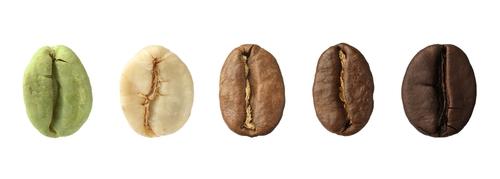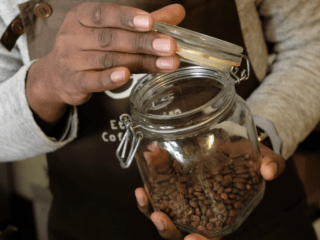Coffee Curiosity: The Top 10 Questions About Coffee Answered!
Do you have a burning curiosity about coffee? Are you looking to find out the answers to some of the most commonly asked Coffee Questions? Then look no further! In this blog post, we will explore the top 10 Coffee Questions that have been asked time and time again. From how coffee is made, to the benefits of drinking it – all your questions will be answered in this comprehensive guide! So grab a cup of joe and get ready to discover the answers to all of your coffee-related questions!
1. The Origins of Coffee and How It Became a Global Favorite
Coffee, the beloved beverage that fuels mornings and provides comfort throughout the day, has a rich and fascinating history. Its origins can be traced back to ancient Ethiopia, where the legend of a goatherd named Kaldi and his dancing goats tells the tale of coffee’s discovery. According to the story, Kaldi noticed that his goats became energized and restless after consuming certain berries from a particular tree. Curiosity piqued, Kaldi decided to try the berries himself and experienced a similar burst of energy.
Word of this newfound discovery spread, and coffee began its journey from Ethiopia to the Arabian Peninsula. It quickly gained popularity among Sufi monks who used it to stay awake during their nighttime prayers. From there, coffee found its way to Europe and eventually made its way to the Americas.
Coffee’s rise to global popularity can be attributed to its captivating aroma, stimulating effects, and ability to bring people together. It became a symbol of social interaction, with coffeehouses popping up in major cities around the world, serving as meeting places for intellectuals, artists, and politicians.
Today, coffee is an integral part of many cultures, and its consumption continues to grow worldwide. From artisanal cafes to convenience store counters, the availability of coffee has never been greater. It has become a staple in our daily routines, offering a moment of solace or a jolt of energy.
2. How to Brew the Perfect Cup of Coffee
Brewing the perfect cup of coffee is an art that requires attention to detail and a little bit of experimentation. While everyone may have their own preferences when it comes to flavor and strength, there are a few key steps that can help you achieve that perfect brew every time.
First and foremost, start with good quality coffee beans. The flavor of your coffee largely depends on the quality and freshness of the beans you choose. Look for beans that have been roasted recently and try to opt for whole beans rather than pre-ground coffee for a fresher taste.
Next, grind your beans right before brewing. The size of the grind can greatly affect the flavor of your coffee. For a standard drip coffee maker, a medium grind is usually recommended. However, if you’re using a French press, you’ll want a coarser grind, while an espresso machine requires a fine grind.
When it comes to the water-to-coffee ratio, a general rule of thumb is to use one to two tablespoons of coffee for every six ounces of water. This can be adjusted based on your personal taste preferences. Additionally, make sure to use filtered water for the best taste.
Temperature is another crucial factor in brewing the perfect cup of coffee. The water should be between 195-205°F (90-96°C) for optimal extraction. If the water is too hot, it can lead to a bitter taste, while water that is too cool may result in a weak brew.
Finally, be mindful of the brewing time. Different brewing methods have different time requirements, so follow the instructions for your specific brewing equipment. Over-extraction can result in a bitter taste, while under-extraction may produce a weak or watery cup of coffee.
3. What is the Difference Between Light, Medium, and Dark Roast?
When it comes to coffee, one of the most common questions is about the different roasts and what sets them apart. So, let’s dive into the world of light, medium, and dark roast and unravel the differences between them.
Light roast coffee is known for its bright and lively flavors. It is roasted for a shorter amount of time, which allows the natural flavors of the coffee beans to shine through. Light roasts typically have a higher acidity level and a lighter body, making them perfect for those who enjoy a crisp and vibrant cup of coffee. They often exhibit fruity, floral, or tea-like notes, creating a delicate and refreshing flavor profile.

On the other hand, medium roast coffee strikes a balance between the acidity of light roast and the richness of dark roast. This roast brings out a smooth and well-rounded flavor with a hint of sweetness. Medium roasts have a slightly darker color and a more balanced acidity. They offer a fuller body and a mellow flavor, making them a popular choice for those seeking a versatile and approachable cup of coffee.
Dark roast coffee is characterized by its bold and intense flavors. The beans are roasted for a longer period of time, resulting in a rich, robust taste and a dark brown or even black appearance. Dark roasts have lower acidity and tend to have a fuller body. They often exhibit flavors like chocolate, caramel, or even smokiness. Dark roasts are popular among those who prefer a strong and deeply flavored coffee experience.
4. Does Coffee Really Help You Wake Up?
If you’re like many people, the first thing you reach for in the morning is a cup of coffee. But does coffee actually help you wake up? The short answer is yes, it does. But let’s delve deeper into why that is.
Coffee contains a natural stimulant called caffeine. When you drink coffee, the caffeine is absorbed into your bloodstream and makes its way to your brain. Once there, it blocks the neurotransmitter adenosine, which is responsible for making you feel tired. By blocking adenosine, caffeine helps to increase alertness and wakefulness.
But that’s not all caffeine does. It also stimulates the release of adrenaline, which can give you a burst of energy and improve your focus. This is why many people feel more productive and alert after a cup of coffee.
It’s important to note that the effects of caffeine can vary from person to person. Some people may be more sensitive to its effects and may feel more awake and alert after just a small amount of coffee, while others may need more to achieve the same level of wakefulness.
Additionally, the time of day can also affect how caffeine affects your body. Consuming caffeine too close to bedtime can disrupt your sleep, making it harder for you to fall asleep and get the rest you need.
5. Is It Okay to Drink Coffee Every Day?
Coffee lovers rejoice! If you’re wondering whether it’s okay to drink coffee every day, the answer is a resounding yes! Coffee is a beloved beverage enjoyed by millions around the world, and incorporating it into your daily routine can have some surprising health benefits.
Studies have shown that moderate coffee consumption, typically defined as three to five cups per day, is not only safe but may actually have several positive effects on your health. Coffee is rich in antioxidants, which can help protect against chronic diseases such as heart disease, diabetes, and certain types of cancer.
Furthermore, coffee has been linked to a reduced risk of developing conditions like Parkinson’s disease and Alzheimer’s disease. It can also improve cognitive function, enhance mood, and increase alertness, making it the perfect pick-me-up for those groggy mornings.
Of course, it’s important to note that everyone’s body is different, and individual sensitivities to caffeine can vary. Some people may experience negative effects such as jitters, digestive issues, or disrupted sleep patterns. If you find that coffee doesn’t agree with you or interferes with your sleep, it may be best to limit your consumption or opt for decaffeinated varieties.
6. How Much Caffeine is in a Cup of Coffee?
If you’re someone who relies on a cup of coffee to kickstart your day, you may be curious about how much caffeine is actually in that cup of joe. Well, wonder no more! In this section, we’ll delve into the caffeine content of coffee and help you understand just how much of a boost you’re getting.
The caffeine content in a cup of coffee can vary depending on several factors, including the type of coffee bean, the brewing method, and the serving size. On average, an 8-ounce cup of brewed coffee contains around 95 milligrams of caffeine. However, it’s important to note that this is just an estimate, as caffeine levels can range from 30 to 200 milligrams in a standard cup.
If you prefer a stronger jolt of caffeine, you might opt for an espresso shot. A 1-ounce shot of espresso typically contains around 63 milligrams of caffeine, but again, this can vary depending on the beans and the brewing process.
It’s worth mentioning that different types of coffee, such as decaf or instant, will have varying levels of caffeine. Decaffeinated coffee usually contains around 2 to 5 milligrams of caffeine per 8-ounce cup, while instant coffee typically has slightly less caffeine than regular brewed coffee.
Remember, caffeine affects everyone differently, and your own tolerance may vary. Some people may be more sensitive to its effects, while others may require a higher dose to feel the same pick-me-up. So, whether you’re reaching for that cup of coffee for the energy boost or simply for the love of the flavor, now you know just how much caffeine you’re getting.
7. What is Specialty Coffee?
Specialty coffee is more than just your average cup of joe. It is a term used to describe coffee that has been sourced, roasted, and prepared with exceptional care and attention to detail. It represents the highest quality coffee available, with an emphasis on flavor, sustainability, and ethical practices.
But what sets specialty coffee apart from the rest? First and foremost, it starts with the beans. Specialty coffee is made from Arabica beans, which are known for their superior taste and aroma. These beans are grown in specific regions around the world that offer the ideal climate and conditions for coffee cultivation.
The next key factor is the roasting process. Specialty coffee roasters carefully roast the beans in small batches, ensuring that they are roasted to perfection to bring out the unique flavors and characteristics of each coffee variety. This attention to detail allows for a more nuanced and complex cup of coffee.
Lastly, specialty coffee is often associated with sustainable and ethical practices. Specialty coffee farms prioritize environmentally-friendly farming methods and fair treatment of workers. This includes practices such as organic farming, shade-grown cultivation, and direct trade relationships with farmers.
8. How to Store Coffee Beans Properly
Storing coffee beans properly is crucial to preserving their flavor and freshness for as long as possible. Here are some tips on how to store your coffee beans to ensure they stay at their best:
- Keep it airtight: Oxygen is coffee’s worst enemy as it causes oxidation and degrades the flavor. Store your coffee beans in an airtight container, such as a mason jar or airtight coffee canister, to keep oxygen out.
- Avoid light and heat: Exposure to light and heat can also accelerate the breakdown of coffee’s flavors. Store your coffee beans in a cool, dark place, away from direct sunlight or heat sources like the stove or oven.
- Grind as you go: Coffee beans stay fresher longer than pre-ground coffee. It’s best to grind your beans just before brewing to maximize the flavor. Invest in a good-quality burr grinder to ensure a consistent grind size.
- Use whole beans: If possible, buy whole beans instead of pre-ground coffee. Whole beans have a longer shelf life and maintain their flavor better. Grind only the amount you need for each brew.
- Don’t store in the fridge or freezer: Contrary to popular belief, storing coffee beans in the fridge or freezer is not recommended. The moisture and fluctuating temperatures can cause condensation, which leads to flavor degradation. Instead, opt for a cool, dark pantry or cabinet.
9. Why Does Coffee Cause Stomach Upset?
Ah, the bitter reality of coffee and its occasional impact on our stomachs. Many coffee lovers have experienced the unwelcome side effects of an upset stomach after enjoying their favorite brew. But why does coffee have this effect? Let’s dive into the science behind it.
One of the main culprits is the acidity of coffee. Coffee is naturally acidic, and this can irritate the lining of the stomach, leading to discomfort or even acid reflux. The high levels of caffeine in coffee can also stimulate the production of stomach acid, exacerbating the issue for those with sensitive stomachs.
Additionally, certain compounds in coffee, such as catechols and N-methylpyridinium, can stimulate the production of gastric acid and increase the contractions of the stomach muscles. This can lead to feelings of discomfort, bloating, or even diarrhea in some individuals.
But don’t fret, there are ways to minimize the risk of stomach upset while still enjoying your daily cup of joe. Opting for low-acid or decaffeinated coffee can help reduce the acidity and potential irritation. It’s also important to consume coffee in moderation and avoid drinking it on an empty stomach.
If you find that coffee consistently upsets your stomach, you may want to consider other options such as herbal teas or caffeine alternatives. Everyone’s digestive system is different, so listen to your body and make choices that work best for you.
10. Can Drinking Coffee Improve Your Health?
If you’re a coffee lover, you’ll be thrilled to know that your daily cup of joe may have some surprising health benefits. Numerous studies have suggested that drinking coffee in moderation can have positive effects on your overall health.
First and foremost, coffee is rich in antioxidants, which can help protect against chronic diseases such as heart disease, diabetes, and certain types of cancer. These antioxidants help to reduce inflammation in the body and protect cells from damage caused by free radicals.
Additionally, coffee has been linked to a reduced risk of developing conditions like Parkinson’s disease and Alzheimer’s disease. It may also improve cognitive function, enhance mood, and increase alertness, thanks to the stimulating effects of caffeine.
Furthermore, coffee has been found to have potential benefits for liver health. Research has shown that regular coffee consumption may help protect against liver diseases such as cirrhosis and liver cancer.
However, it’s important to note that individual responses to coffee can vary. Some people may experience negative effects such as jitters, digestive issues, or disrupted sleep patterns. It’s always a good idea to listen to your body and consume coffee in moderation.

About the Author
This article was written by the team at CoffeeCode, your go-to coffee blog with a focus on inspirational design, and sustainability.




